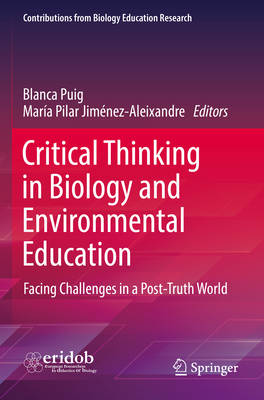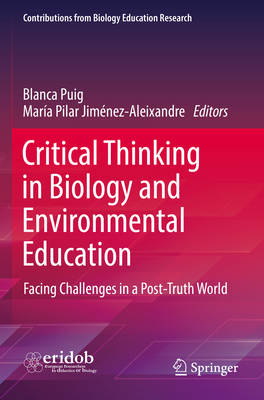
- Retrait gratuit dans votre magasin Club
- 7.000.000 titres dans notre catalogue
- Payer en toute sécurité
- Toujours un magasin près de chez vous
- Retrait gratuit dans votre magasin Club
- 7.000.0000 titres dans notre catalogue
- Payer en toute sécurité
- Toujours un magasin près de chez vous
Critical Thinking in Biology and Environmental Education
Facing Challenges in a Post-Truth World
Description
This volume seeks to broaden current ideas about the role of critical thinking (CT) in biology and environmental education considering educational challenges in the post-truth era. The chapters are distributed into three sections, perspectives of a theoretical character (part I), empirical research about CT in the context of biology and health education (part II), and empirical research on CT in the context of environmental and sustainability education (part III). The volume includes studies reporting students' engagement in the practice of critical thinking, and displays how CT can be integrated in biology and environmental education and why biology and environmental issues are privileged contexts for the development of CT. The chapters examine a range of dimensions of CT, such as skills, dispositions, emotions, agency, open-mindedness, or personal epistemologies. In addition, they explore topics such as climate change, sustainable diets, genetically modified food, vaccination, acceptance of evolution, homeopathy, and gene cloning.
Concluding remarks regarding the connections between the chapters and future directions for the integration of critical thinking in biology and environmental education are presented in a final chapter.
Spécifications
Parties prenantes
- Editeur:
Contenu
- Nombre de pages :
- 276
- Langue:
- Anglais
- Collection :
Caractéristiques
- EAN:
- 9783030920081
- Date de parution :
- 02-03-23
- Format:
- Livre broché
- Format numérique:
- Trade paperback (VS)
- Dimensions :
- 156 mm x 234 mm
- Poids :
- 408 g

Les avis
Nous publions uniquement les avis qui respectent les conditions requises. Consultez nos conditions pour les avis.





